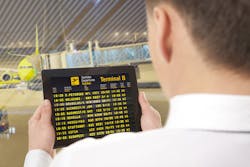Smartphones and mobile apps are enabling tens of millions of road warriors to remain connected and productive as they travel the globe. Airlines are offering consumer facing mobile apps with the understanding that these apps will be the default connection point for communicating with passengers. An increasing number of airline and travel services companies are rolling out mobile apps for their own employees to improve the level of service provided to global travelers.
Mobile Apps Transforming Travel
Mobile apps have taken the consumer world by storm, and businesses are following suit as the enterprise mobility market is expected to reach $360 billion by 2020. Organizations are seeing mobile as a tool not just for customer engagement, but for business process transformation as well. With its high percentage of mobile workers, the travel industry has the potential to reap outsized benefits from mobile apps.
Like many field services dominated industries, most workers in travel or transportation don’t have a desk. With 71 percent of workers accessing enterprise data on mobile for at least two hours a week, many businesses need to provide a way for 100 percent of their workers to securely access critical enterprise systems on-the-go.
Enabling mobile workers is critical in the airline industry. Flight attendants, pilots, mechanics, ticket and baggage agents and maintenance personnel are all tapping into mobile applications. According to the 2015 Airline IT Trends Survey by SITA, 55 percent of airline personnel use smartphones for work tasks, and this will grow to 73 percent by 2018.
Airline Apps for Employees
Alaska Airlines is a great example of an organization leveraging and seeking benefits from enterprise mobility. With their powerful mobile ecosystem – the airline is seeing efficiencies across the company including more on-time departures and arrivals, and better customer experiences. Alaska was the first airline to equip its pilots with iPads, an innovative step the airline took to meet employee needs.
“People are our greatest asset,” says Derek Chan, enterprise mobility architect, Alaska Airlines. “Their goal is customer service, so our mobility strategy revolves around our employees and what tools we can provide that will help them serve the customers as best they can.”
Alaska Airlines is one example of a company in this industry implementing a mobility strategy. Using a mobile application management and security company, Alaska Airlines has successfully secured its enterprise mobile apps across more than 10,000 devices via a private, branded app store, boasting an adoption rate of 70 percent across its workforce.
With large workforces spread across geographies, time zones and languages, mobile apps provide a flexible method for reaching all types of employees in the travel industry. Whether they are located inside terminals, on the jet ways, on the ground or in the air, using mobile devices issued to them by the airline or using a personal, bring your own device (BYOD), organizations leverage a mobile application management solution to enable these mobile workers with key data and information.
These apps are also critical for workers to communicate and collaborate with colleagues in a timely fashion. More so than many other industries, there are significant time constraints in making decisions that impact the schedules of hundreds or thousands of travelers. Mobile apps allow airlines to deliver information that can help workers make better informed decisions to minimize service disruptions.
With the requirements that come with working in secure environments, it’s vital that mobile apps are only available to authorized users. Distributing apps via a public app store is not an option. Instead, these apps should be pushed privately to users via enterprise mobile app catalogs. These catalogs can authenticate users, and only present the specific apps that user needs and is permitted to use.
Making Sense of IoT Data
Mobile apps are democratizing data for customers, putting data once limited to the airlines into the hands of passengers via apps on their smartphones. As customers have easy access to an increasing amount of data – flight status, seat assignments, check bag tracking – airlines will need to increase their ability to make sense and intelligently deliver this data to employees. Providing employees with mobile apps to interpret and act on this data will provide opportunities to head off potential service disruptions, or deliver superior service by alerting passengers to potential issues with their travel plans.
In the near future, the flow of actionable data will expand significantly as the cost of connecting things to the Internet is falling rapidly. Driven by the Internet of Things (IoT) revolution, airlines will increasingly attach sensors to nearly everything that moves. Instead of tracking airplanes and engines as is done today, airlines will track an increasing number of individual aircraft parts, service vehicles, and people. Tracking ground crew can improve response times, but also alert workers to impending dangers based on their location. For customers, sensors attached to bags could end the nightmare of lost baggage, allowing airlines to quickly locate, route, and delivery missing baggage.
The primary window for viewing, understanding and taking action on the data driven by IoT will be the mobile app. Mobile workers will be the key actors that receive alerts about impending changes in their environment and the processes around them. They have the best opportunity to take actions that create benefits as well as avoid or limit potential losses.
Mobile Apps for All Employees
As the travel industry continues to advance with airlines leveraging technology to improve service, safety and speed of travel, it is clear that mobile apps are needed on both sides of the ticket counter. For every capability that is deployed for passengers, there needs to be equal or greater visibility and control of processes from mobile devices for all airline workers.
In an industry were competition is cutthroat, airlines that don’t effectively deliver mobile apps to their employees will fall behind those that are putting actionable data in the hands of their employees. The coming wave of IoT data will only magnify the impact on laggards as travelers will gravitate towards airlines that provide better mobile experiences driven in large part by a mobilized workforce. The degree of data that is available to passengers will increasingly be seen as a key determinant for loyalty. Providing this beneficial data to passengers will require a connected workforce that is plugged in, and can act on a broad set of IoT data, allowing the airline to deliver a safe and enjoyable travel experience to millions of passengers.
Chris Hazelton is director of product marketing & strategy at Apperian.



